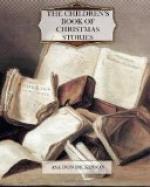“Be lucky, house,” he said, “for you have received and entertained the luck-bringers. And be lucky, Toinette. Good temper is good luck, and sweet words and kind looks and peace in the heart are the fairest of fortunes. See that you never lose them again, my girl.” With this, he, too, kissed Toinette’s hand, waved his feathered cap, and—whir! they all were gone, while Toinette, covering the fire with ashes and putting aside the little cups, stole up to her bed a happy child.
IX. THE VOYAGE OF THE WEE RED CAP
Published originally in the Outlook. Reprinted here by arrangement with the author.
RUTH SAWYER DURAND
It was the night of St. Stephen, and Teig sat alone by his fire with naught in his cupboard but a pinch of tea and a bare mixing of meal, and a heart inside of him as soft and warm as the ice on the water-bucket outside the door. The tuft was near burnt on the hearth—a handful of golden cinders left, just; and Teig took to counting them greedily on his fingers.
“There’s one, two, three, an’ four an’ five,” he laughed. “Faith, there be more bits o’ real gold hid undther the loose clay in the corner.”
It was the truth; and it was the scraping and scrooching for the last piece that had left Teig’s cupboard bare of a Christmas dinner.
“Gold is betther nor eatin’ an’ dthrinkin’. An’ if ye have naught to give, there’ll be naught asked of ye;” and he laughed again.
He was thinking of the neighbours, and the doles of food and piggins of milk that would pass over their thresholds that night to the vagabonds and paupers who were sure to come begging. And on the heels of that thought followed another: who would be giving old Barney his dinner? Barney lived a stone’s throw from Teig, alone, in a wee tumbled-in cabin; and for a score of years past Teig had stood on the doorstep every Christmas Eve, and, making a hollow of his two hands, had called across the road:
“Hey, there, Barney, will ye come over for a sup?”
And Barney had reached for his crutches—there being but one leg to him—and had come.
“Faith,” said Teig, trying another laugh, “Barney can fast for the once; ’twill be all the same in a month’s time.” And he fell to thinking of the gold again. A knock came at the door. Teig pulled himself down in his chair where the shadow would cover him, and held his tongue.
“Teig, Teig!” It was the widow O’Donnelly’s voice. “If ye are there, open your door. I have not got the pay for the spriggin’ this month, an’ the childher are needin’ food.”
But Teig put the leash on his tongue, and never stirred till he heard the tramp of her feet going on to the next cabin. Then he saw to it that the door was tight-barred. Another knock came, and it was a stranger’s voice this time:




